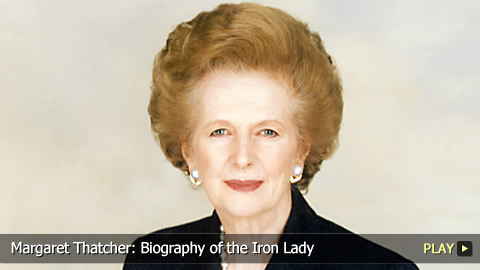Margaret Thatcher: Biography of the Iron Lady

- Early Life
- Oxford University
- Start in Politics
- Member of Parliament
- Member of the Opposition
- Thatcher, Milk Snatcher
- First Female Opposition Leader
- The Iron Lady
- Britain's First Female PM
- Tough Decisions
- Controversial Leader
- Falklands War
- Assassination Attempt
- International Conflicts
- Third Term and Resignation
- Retirement from Public Office
- Post-Political Life
- Legacy
Early Life
Margaret Hilda Roberts was born October 13th, 1925 in Grantham, England to a conservative Methodist family. She was exposed to politics early when her father was their hometown mayor.
Oxford University
In 1947, she graduated with a chemistry degree from Oxford University, and began working as a research chemist.
Start in Politics
Two years later, she ran for a Dartford parliamentary seat. Though she lost, she impressed crowds with powerful speeches. She also met Denis Thatcher, whom she married in 1951. She then briefly studied law, before giving birth to twins in 1953.
Member of Parliament
By 1959 Thatcher was back in politics as a Member of Parliament in the House of Commons. After two years, she was promoted to undersecretary for pensions and national insurance.
Member of the Opposition
In 1964, the Conservatives lost control of the government. In the meantime, Thatcher took a spot in the Opposition’s Shadow Cabinet. She continued to broaden her political horizons by traveling through the United States. She was eventually promoted to Education Minister of the Shadow Cabinet.
“Thatcher, Milk Snatcher”
The Conservatives regained power in 1970. Thatcher became Secretary of State for Education and Science, and made some unpopular budget cuts. After axing a school milk program, she earned the nickname “Thatcher, milk snatcher.” She quickly grew disillusioned with the plight of women in politics.
First Female Opposition Leader
By 1974, the Conservatives were voted out again in favor of the liberal Labour Party. Thatcher’s prominence as a Conservative increased, and one February 11th, 1975 she became the party leader and the first female Opposition Leader in UK history.
The Iron Lady
Thatcher then polished her image and delivery to assure respect. In 1976, she was nicknamed “Iron Lady” by a Russian newspaper for her ardent stance against communism.
Britain’s First Female PM
Meanwhile, the chaotic British political climate included labor union issues, increasing unemployment and financial difficulties. These problems helped the Conservatives seize power in 1979. History was made again when on May 4th of that year, Margaret Thatcher was appointed Britain’s first female Prime Minister.
Tough Decisions
Thatcher immediately made tough decisions in an attempt to control the ongoing recession: she raised interest rates, cut social spending and privatized industries like gas, water and electricity. The economy only recovered during her second term, in 1987.
Controversial Leader
Her stances on issues like immigration and unions made Thatcher a controversial leader, and this led to fluctuating approval ratings during her tenure. As Prime Minister, she aligned herself with U.S. president Ronald Reagan, as the pair shared similar right-wing viewpoints.
Falklands War
Thatcher faced a high-profile international challenge in April 1982 when Argentina invaded the Falkland Islands. Though they were part of Britain, these islands were located near Argentina and this caused tension between the nations. The UK ultimately won the Falklands War in June of that year after Thatcher dispatched military forces to the islands.
Assassination Attempt
The beginning of her second term in 1983 was exemplified by a long and violent British mining strike. The next year, Thatcher barely escaped assassination by the Irish Republic Army in response. Her unfazed showing after that attempt increased her popularity.
International Conflicts
During her second term, foreign policy matters she addressed included the Cold War, and the U.S. bombings of Libya.
Third Term and Resignation
Her unprecedented third term began in 1987. Thatcher’s introduction of an unpopular tax lost her support within her party and in the public. In 1989, she was challenged for party leadership. Ultimately, she left office on November 22nd, 1990, and was replaced as Prime Minister by John Major.
Retirement from Public Office
Thatcher then returned to her MP job, before retiring in 1992. That year, she was also appointed to the House of Lords.
Post-Political Life
Following her political career, she wrote several books and toured as a public speaker. Her lecturing career ended in 2002 after she suffered a series of small strokes, and her husband of over fifty years passed away the next year. In 2011, Thatcher’s life story made it to the big screen, with Meryl Streep taking the role of “The Iron Lady.”
Legacy
Thatcher was a controversial British figure: her economic performance was praised, while her social policies were divisive. However, Margaret Thatcher undoubtedly changed the political landscape of the United Kingdom forever.
